MusicNOW celebrates Steve Reich’s 80th birthday in style
In recent seasons, MusicNOW programs have tended to heavily favor electronic music by young composers with a turntable setup–the appearance of which onstage was a fairly accurate inverse predictor of the quality of the music that would be forthcoming. Works of acknowledged American masters were largely ignored in the Chicago Symphony Orchestra’s new-music series.
Happily, current MusicNOW curators, composers Sam Adams and Elizabeth Ogonek, seem to have a broader and more inclusive historic perspective. Monday night’s program at the Harris Theater was devoted entirely to music of Steve Reich, who celebrated his 80th birthday last month.
Reich provided his own introductions in video segments from an interview with Adams, and his witty, engaging and unpretentious comments added to the evening’s musical pleasures. Too bad the amplified audio quality made his words fitfully indecipherable, a recurring problem in the series this season.
The three works that made up the MusicNOW program spanned as many decades of Reich’s career and provided a rough sampler of Reich’s musical development.
Different Trains has become one of Reich’s most-performed works. Premiered by Kronos Quartet in 1988, the work marks a leap in the phasing techniques of the composer’s early 1960s tape pieces like Come Out and It’s Gonna Rain.
The three-part work has personal significance as well as historic resonance. Different Trains recalls Reich’s long bicoastal train trips as a child shuttling between his divorced parents, contrasted with trains that transported European Jews to concentration camps in the 1940s, as well as postwar trains in America. The music draws on the spoken words of Reich’s childhood governess, a train conductor, and Holocaust survivors, with the short riffs and musical fragments taken from snippets of their conversations. A live string quartet performs against the taped voices, train sounds, and prerecorded quartet music.
Despite its logistical complexity, Different Trains is a lean, organic and unsentimental work, strangely compelling in its relentless chugging progress, varied meters and subtly shifting musical lines.
Violinists Qing Hou and So Young Bae, violist Danny Lai and cellist Katinka Kleijn offered a polished and accomplished performance, skillfully handling the tricky coordination with the prerecorded music and voices. Still, there are more interpretive opportunities in this music than was always apparent from these CSO members Monday night, and one wanted more expressive detailing in a rendering that was often merely efficient.
In Proverb, written for the Hilliard Ensemble in 1995, Reich takes inspiration from the 12th-century composer Perotin in this setting of a quotation from the philosopher Ludwig Wittgenstein (“How small a thought it takes to fill a whole life!”). Written for five voices and pairs of electric organs and vibraphones, Proverb is among Reich’s most striking works, complex in its canonic working out and inversions, yet fluently melding old modes with a rhythmic freedom and contemporary feel.
The Northwestern University Contemporary Music Ensemble offered an alert and responsive performance led by conductor Alan Pierson. At times one wanted a defter balancing of forces, with one of the vibraphones tending to dominate the textures. Yet Reich’s melding of the ancient and modern is graceful and often haunting with the three sopranos (Hannah Dixon McConnell, Daniela Rodriguez-Firmani and Lauren Bigelow) handling the high, mercilessly exposed writing with aplomb.
The short program closed with Reich’s Double Sextet, winner of the 2008 Pulitzer Prize in music. As the title indicates, the work is crafted for two identical ensembles of six players each (flute, clarinet, vibraphone piano, violin and cello). The mirrored music is cast in traditional tripartite form and Reich throws off an array of timbral variety in the bravura display of the outer movements with a more meditative introspection in the central section.
Here too, the performance would have benefited from finer balancing, but Pierson led a dynamic and propulsive performance with ample energy in the closing movement. Pianists Daniel Schlosberg and Mio Nakamura were especially notable, driving Reich’s exhilarating, inimitably intricate music.
Posted in Performances



